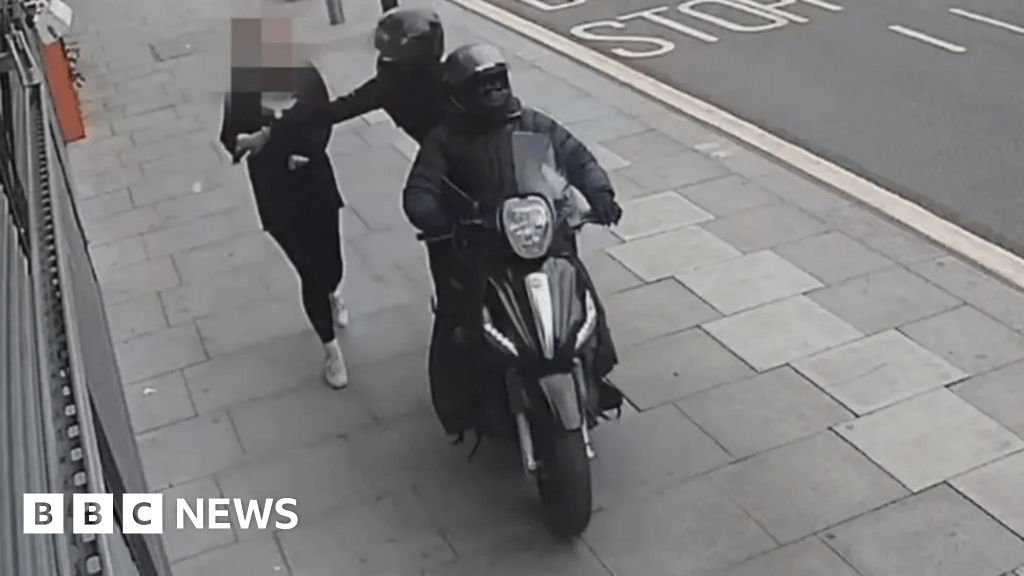Technology reporter
High-ranking officials from Apple and Google have expressed disagreement with the police regarding their strategies to combat phone theft in the UK.
James Conway from the Met stated to the Commons Science, Innovation and Technology Committee that two-thirds of all thefts in London are now related to mobile phones.
Given that up to 70% of knife crime is associated with robbery, he emphasized that phone theft significantly contributes to the violence issue.
The Met is advocating for phone manufacturers to utilize the unique identifying number, or IMEI, to block devices reported as stolen.
However, both Apple and Google, leading players in the market, have raised objections to this approach.
“Concentrating solely on IMEI blocking may overlook various issues,” said Gary Davis, Apple’s head of law enforcement, during the committee session.
“We are concerned about potential fraud… particularly regarding individuals claiming ownership of devices,” he added.
While stolen devices can be blocked from being used in the UK via their IMEI, this is not applicable on a global scale.
Consequently, stolen phones may still operate in other countries if criminals manage to bypass device security.
Mr. Davis expressed worries about phone owners facing “numerous fraud attempts,” estimating that over a thousand individuals attempt to access devices each month.
“These attempts are often malicious, potentially even for blackmail,” he noted.
“I hope that our experience and knowledge regarding attack vectors would carry some weight in this discussion.”
The companies highlighted they have introduced several new security features in the past year to tackle phone theft.
Apple has implemented Stolen Device Protection, while Google’s Android has launched Theft Detection Lock.
IMEI Blacklist
Law enforcement officials stated they seek action from phone manufacturers to curtail further theft incidents.
Darren Scates, the Met’s chief technology officer, remarked that 75% of stolen phones are trafficked abroad, with 28% finding their way to either China or Hong Kong.
“We urge cloud providers to specifically prevent lost or stolen devices from accessing their cloud services,” he emphasized.
“This doesn’t even require police intervention.”
He mentioned that they have been making this request since October 2023, but have yet to persuade the firms to take action.
Some MPs accused the tech giants of lacking the determination to act.

Metropolitan Police
“You could easily prevent phones listed on the IMEI blacklist from accessing your services starting tomorrow, but you choose not to,” remarked Lib Dem MP Martin Wrigley.
“That’s not a promise we’re making,” Google software engineering manager Simon Wingrove responded, explaining that a comprehensive industry approach is necessary.
He mentioned that the global IMEI database is managed by network carriers, which raises the need for a collaborative discussion among industry players.
“If we want to modify that database for alternative uses to block devices, it necessitates an industry-wide consensus that extends beyond my authority as a Google engineer,” he stated.
“We need to determine collectively as an industry whether that is a feasible and prudent step.”
He also noted Google’s efforts on Android’s factory reset protection as a continued commitment to enhance security and deter thieves from resetting stolen devices.
“The recent updates we’ve announced represent significant progress, and we are optimistic about their impact,” he added.
‘You’re Delaying Action’
A primary theme of the discussion was the confrontation between MPs and Mr. Davis regarding the second-hand parts market.
“I fear that if we concentrate solely on IMEI blocking, we might overlook the market for parts,” he cautioned the committee, which met with dissatisfaction from attendees.
“The committee clearly feels that neither Google nor Apple has a decisive strategy for effective phone protection that doesn’t solely rely on IMEIs,” remarked Labour MP Chi Onwurah.
Apple has raised concerns that stolen devices are not just being reused but are often dismantled into parts like screens and batteries that can be resold.
“Our strongest defense is Activation Lock,” he asserted.
“You might argue it’s ineffective since thefts continue, but it’s our best available solution.”
Activation Lock ties specific iPhone or iPad components to a user’s Apple ID, requiring a password for repairs.
This feature was positively received when introduced as a measure against theft.
However, the committee’s focus remained on preventing the IMEI of stolen phones from being used elsewhere.
“Many perceive that you’re hesitating to take action,” noted Conservative MP Kit Malthouse.
In response, Mr. Davis stated he believes Activation Lock is “a significant advancement” in disrupting the second-hand parts market.
“IMEI blocking could indeed be a logical next step,” he acknowledged.
“That said, I emphasize the importance of maintaining traditional policing methods, including submitting requests to us for stolen devices, and ensuring Apple responds to those queries.”
“Unfortunately, we’re not witnessing sufficient actions in this area, and that’s critical.”



